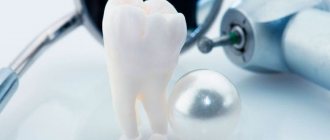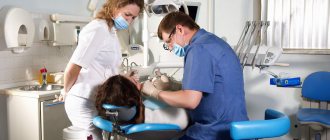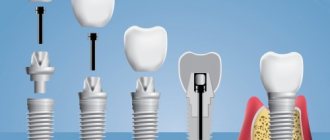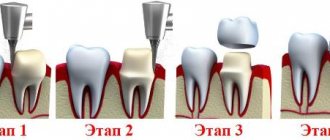Dental implantation is a responsible operation, the recovery period after which is associated with the use of medications. For this reason, implantation during pregnancy is contraindicated. In addition, hormonal changes during pregnancy weaken the body, which has to adapt to new working conditions.
Dental problems often appear during pregnancy. Hormonal changes in the body also negatively affect dental health. A woman should definitely undergo a medical examination.
Dental implantation is prohibited for pregnant women, even if it is necessary to restore 1 or 2 teeth.
Removable prosthetics with complete edentia are also prohibited. Pregnancy should be planned after implantation.
Why is implantation prohibited during pregnancy?
- The operation itself, in which a titanium root prosthesis is installed into the bone (takes place with anesthesia), is prohibited for expectant mothers. After the operation, the doctor prescribes anti-inflammatory and pain medications, most of which should not be used by pregnant women.
- If complications arise during the period of osseointegration, additional therapy will be required, and this will negatively affect the child’s health. Any worries during pregnancy can have negative consequences.
- During pregnancy, the immune system is weakened, so the inflammatory process, which under normal conditions can be quickly cured, can last for a long time in a pregnant woman.
Contraindications to medications and examinations
The first thing that is not recommended for pregnant women is an X-ray examination, be it a regular targeted X-ray or a computed tomography scan, because harm to the fetus may outweigh the benefit to the mother. The fact is that even when treating pulpitis, you need to take at least 2 pictures; during prosthetics and implantation, you also need to undergo x-ray diagnostics several times. As for toothache tablets, you can take them only after consulting a doctor, because Some drugs sharply lower blood pressure.
The use of antibacterial drugs, which are prescribed after tooth extraction and implantation, when treating gums, can be dangerous for the baby. Moreover, in a number of situations the patient needs to take several antibiotics at once, affecting different forms of bacteria. And doctors prescribe such drugs strictly according to indications - independent use is prohibited. By the way, cephalosporin antibiotics (cefazolin, for example) are considered the most “harmless” during pregnancy. Also, during treatment and prosthetics during pregnancy (and not only) there are contraindications for anesthesia - a regular “freezing” injection, sedation or anesthesia (we will discuss this in more detail later).
PROSTHETIC PROSTHETICS WITH 4 STRAUMANN IMPLANTS “teeth in 1 day” - RUB 220,000. until January 15, 2022!
Complex implantation using ProArch technology (Switzerland) with immediate loading on the day of surgery!
Call now or request a call
Is it possible to combine dental implants and pregnancy?
- During pregnancy, the immune system is weakened, so it takes longer to recover, and infections develop quickly.
- Any surgical intervention is stressful for the body and is strictly contraindicated for pregnant women.
- The preparatory stage includes a mandatory x-ray examination, which is undesirable for the unborn baby.
- Pregnant women should not be given anesthesia or take anti-inflammatory drugs.
- Treatment of possible complications after implantation will also require medication.
- If surgery is already planned and the woman finds out she is pregnant, the surgery should be cancelled.
Implantation in the first trimester of pregnancy is dangerous. All vital organs are formed in a woman’s body, and the operation will not only negatively affect this process, but can provoke an interruption.
Immediately after childbirth, implantation is also undesirable, since the body needs time to recover. About a year.
Dental prosthetics for pregnant women
At the beginning of gestation, vital organs are formed, so it is better to postpone treatment by an orthodontist to the 2nd trimester, when there is less risk of harming the child’s development. From the 12th week, dentists begin treating diseases such as pulpitis, caries, gingivitis, and stomatitis. In the 2nd trimester, if indicated, dental prosthetics are also performed. The procedure is performed under local anesthesia; general anesthesia is contraindicated for expectant mothers. For pain relief, drugs such as ultracaine and articaine are used, which have a milder effect than similar drugs. To reduce pain after orthodontic intervention, it is allowed to use paracetamol.
Types of prostheses
There are two large groups of prostheses: removable and fixed. Fixed teeth are firmly attached to the roots and require the same care as regular teeth. Removable dentures can be removed from the mouth without assistance for hygienic treatment.
There are several types of removable structures:
- acrylic, having high strength and natural appearance;
- nylon, used in the absence of several teeth;
- acrylic-free, attached directly to the gums;
- clasp, made like a metal frame coated with a layer of acrylic; micro-locks and hooks are used for fastening.
Fixed prostheses are divided into crowns and bridges. The first ones are used when only one tooth is missing. They are made from metal, metal-ceramics and ceramics. In addition, crowns made of aluminum oxide and zirconia are popular. These materials have high strength, and this has a positive effect on the fact that the structure will last longer.
Bridges are used to fit multiple teeth. They are installed based on retained teeth or implanted implants.
Prosthetic methods
Microprosthetics involves the installation of one tooth. Often, ceramics are used to make prostheses, which are characterized by an appearance close to natural. The material has a long service life (up to 15 years). Microprosthetics includes the installation of veneers, inlays, and prostheses with micro-locks.
When is it not recommended to have dentures during pregnancy?
Prosthetics during pregnancy are possible, but according to strict indications and recommendations of a specialist. It should be remembered that manipulations are not performed in the first and third trimester. Therefore, crowns need to be installed only between 12 and 24 weeks.
Lactation
The period of breastfeeding is also a contraindication for implantation, as well as during pregnancy, a woman is prohibited from taking medications. It should be borne in mind that the lactation period is associated with the body’s weak resistance to bacteria, which can develop due to caries or gum disease. The body has not yet been rebuilt, adaptation has not occurred. The medications used can negatively affect the child’s health.
Implants can be installed if lactation has stopped and the child is bottle-fed.
To avoid the need for emergency implantation during pregnancy, it is necessary to eliminate problems in a timely manner, immediately after the discovery of caries and gum disease.
Modern dentistry uses innovative technologies to provide treatment to pregnant women. The doctor will not only eliminate problems in the oral cavity, but will also advise the expectant mother on proper care of her teeth and gums.
Currently, it is possible to use effective drugs that do not cause negative consequences, and replace the radiograph with the use of a dental visiograph.
A woman should ask her doctor about precautions for the upcoming procedures.
Features of treatment
Fortunately, pregnancy is not a contraindication to the treatment of dental pathologies, especially if they cause severe pain and discomfort in the expectant mother. It is very important, even before starting any manipulations, to warn your doctor about your situation and the approximate duration of pregnancy, then he will be able to select the best option for the drugs to be used.
The main indications for emergency treatment are: carious tissue damage, periodontitis, any inflammation in soft tissues, pulpitis, etc. For the restoration of destroyed hard tissues, any composites can be used: chemically and light-curing. However, it is best to avoid enamel whitening procedures for a while.
General anesthesia is contraindicated in this position. It is also worth noting that before treating any pathologies, an x-ray examination of the oral cavity is required. This can be quite harmful for the baby; the safest time for this procedure is the second trimester. In this case, it is very important to cover the surface of the abdomen and thighs with a thick, protective apron.
To install a crown, certain operations are performed:
- Grinding the enamel;
- Depulping;
- Root canal treatment.
Safe anesthesia must be used.
To obtain an x-ray, you should use a device with a low radiation dose.
If prosthetics are performed on the front teeth, you can install ceramic crowns, which do not cause irritation, since the material does not contain metal components.
Paracetamol is used as an anti-pain drug.
In practice, prosthetics for pregnant women are performed only according to strict indications, taking into account the possible risks from the use of medications.
Postponing the installation of crowns is also not the best solution, because the absence of a tooth causes changes in the entire oral cavity. This manipulation is usually performed in the second trimester of pregnancy.
Planning a pregnancy requires certain preparations, including dental treatment. If there is a need for treatment during pregnancy, it is not recommended to postpone it for a long time, since the development of infection will negatively affect the health of the child and mother.
Can I use painkillers during prosthetics?
When planning a pregnancy, it is necessary to make certain preparations - a trip to the dentist and dental treatment. However, when the woman did not have time to undergo treatment earlier, anesthesia can be performed in position, but following the rules. Often, expectant mothers categorically refuse the services of a doctor, believing that the substances used are harmful to the fetus.
Anesthesia for implantation
However, there is no need to delay treatment until the postnatal period, because the infection can negatively affect the health of the mother and baby.
A woman may lose a tooth or get periodontal disease. Before choosing a harmless anesthetic, you need to think about whether its use is necessary? For example, when curing ordinary caries, anesthesia is not needed, but when removing a tooth or inserting teeth, pregnant women cannot do without pain relief.
When choosing a drug, you need to know how it works . The medicine is a medical substance based on adrenaline, which blocks pain and stops bleeding.
However, it can provoke an increase in uterine tone and pressure, which is very risky for miscarriage. Nowadays, substances with the lowest dose of the drug are used, which makes it widely used for pregnant women.
The most common substance in this category is Ultracaine, which does not enter the placenta and milk. In any given case, the doctor chooses the right dose, based on the girl’s personal characteristics and the period.
Why do dentists not recommend installing dental implants during pregnancy?
The period when a fetus develops in a woman’s body is extremely unfavorable for any surgical interventions. This also applies to dental surgery - in particular, the installation of implants. There are several reasons for this, and each of them is really important.
- The influence of anesthesia. Even local anesthesia has a general effect on the body (since, despite the local action, it still spreads through the bloodstream throughout the entire circulatory system). General anesthesia is all the more harmful (and sometimes implantation is carried out under general anesthesia - for example, if several implants are placed at the same time, gum tissue is cut, etc.). But if the body of an adult can cope with the effects of narcotic substances (yes, “narcosis” and “drugs” are not coincidentally the same words!), then this can be very harmful for the fetus, even to the point of irreversible consequences and a threat to pregnancy.
- Exposure to X-rays. Without X-ray examinations, it is impossible to carry out implantation - and X-ray will be needed not just once, but several times: to monitor the engraftment, especially if implantation is carried out in several stages. The permissible radiation dose for a pregnant woman is much lower than for an adult who is not pregnant, so ideally no X-ray examinations should be performed before childbirth.
- The need to take antibiotic drugs. Antibiotics are necessarily prescribed immediately after surgery (in order to avoid infections and relieve inflammation), and they may be needed later - if healing occurs with complications, or the dentist observes a risk of rejection. In addition, even anti-inflammatory drugs (which do not have an antibiotic effect) and painkillers (which may be needed in the first days after surgery) that are harmless to the mother’s body can be harmful to the fetus’ body.
- Stress. It is very undesirable for pregnant women to worry and experience pain - it is a well-known fact. But jaw surgery, with painful sensations during the healing period, is an obvious reason for stress and negative emotions in a woman.
- Weakening of the immune system. Instead of throwing all its “reserves” into protecting the fetus from viruses and other microorganisms, the body will be forced to “dissipate energy” both on pregnancy and on fighting infections in the oral cavity. This is bad not only for the baby in the stomach, but also for the operated area of the jaw - after all, there has been an unhealed wound there for some time, which can easily become infected.
Therefore, dental implantation during pregnancy is considered only as a last resort measure.
Patient Questions
QUESTION Good afternoon, tell me what is the best way to proceed. I had a severely broken molar on the side. It doesn't hurt, but the tongue hurts a little. Is it possible to cure it or put a crown on it? Because I heard that it’s better for pregnant women to get their teeth done in the second trimester, but I’m now in the third. Maria
ANSWER Hello, Maria. In your case, it is better not to wait until after birth. After all, then you simply may not have enough time for treatment, and delaying it can lead to complications. The question of what is best to do - file a tooth, put a filling or a temporary crown - is best decided personally with your dentist after an examination.
1Zhulev E.N. Partial removable dentures, 2011.
Author: Dzagurova E. R. (Thank you for your help in writing the article and the information provided)









